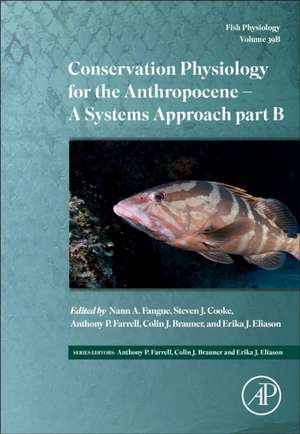Conservation Physiology for the Anthropocene - Issues and Applications: Fish Physiology, cartea 39B
Nann A. Fangue, Steven J. Cooke, Anthony Farrell, Colin Brauner, Erika Eliasonen Limba Engleză Hardback – 17 noi 2022
Other sections discuss Fisheries interactions in a multi-stressor world, Environmental change in riverine systems - Amazon basin stressors, Environmental change in lakes and wetlands – East African basin stressors, Coral reef fish in a multi-stressor world, Polar fish in a multi-stressor world, Physiology informs fisheries restoration and habitat management, A physiological perspective on fish passage and entrainment, Invasive species control and management – the sea lamprey story, and On the conservation physiology of fishes for tomorrow.
- Includes authoritative contributions from an international board of authors, each with extensive expertise in the conservation physiology of fish
- Provides the most up-to-date information on the ways in which different physiological systems are relevant to the management and conservation of fish and fisheries
- Presents the latest release in the Fish Physiology series
- Identifies how anthropogenic stressors perturb physiological systems
- Explores how different physiological systems can be exploited to solve conservation problems
Din seria Fish Physiology
- 27%
 Preț: 969.52 lei
Preț: 969.52 lei - 27%
 Preț: 1156.07 lei
Preț: 1156.07 lei - 38%
 Preț: 593.60 lei
Preț: 593.60 lei - 23%
 Preț: 570.59 lei
Preț: 570.59 lei - 8%
 Preț: 483.18 lei
Preț: 483.18 lei - 24%
 Preț: 524.58 lei
Preț: 524.58 lei - 18%
 Preț: 522.69 lei
Preț: 522.69 lei - 23%
 Preț: 498.09 lei
Preț: 498.09 lei - 9%
 Preț: 562.99 lei
Preț: 562.99 lei - 31%
 Preț: 495.93 lei
Preț: 495.93 lei - 21%
 Preț: 498.47 lei
Preț: 498.47 lei - 17%
 Preț: 497.35 lei
Preț: 497.35 lei - 27%
 Preț: 557.55 lei
Preț: 557.55 lei - 9%
 Preț: 506.27 lei
Preț: 506.27 lei - 11%
 Preț: 665.44 lei
Preț: 665.44 lei
Preț: 498.78 lei
Preț vechi: 798.22 lei
-38% Nou
Puncte Express: 748
Preț estimativ în valută:
95.47€ • 103.74$ • 80.25£
95.47€ • 103.74$ • 80.25£
Carte tipărită la comandă
Livrare economică 14-28 aprilie
Preluare comenzi: 021 569.72.76
Specificații
ISBN-13: 9780128242681
ISBN-10: 012824268X
Pagini: 668
Dimensiuni: 152 x 229 mm
Greutate: 1.06 kg
Editura: ELSEVIER SCIENCE
Seria Fish Physiology
ISBN-10: 012824268X
Pagini: 668
Dimensiuni: 152 x 229 mm
Greutate: 1.06 kg
Editura: ELSEVIER SCIENCE
Seria Fish Physiology
Public țintă
This volume will serve as a resource for learners, fish physiologists, conservation practitioners and fisheries managers.Cuprins
Preface
Nann A. Fangue, Steven J. Cooke, Anthony P. Farrell, Colin J. Brauner and Erika J. Eliason
1. Using physiology to recover imperiled smelt species
Yuzo R. Yanagitsuru, Brittany E. Davis, Melinda R. Baerwald, Ted R. Sommer and Nann A. Fangue
2. Conservation aquaculture—A sturgeon story
W. Gary Anderson, Andrea Schreier and James A. Crossman
3. Using ecotoxicology for conservation: From biomarkers to modeling
Gudrun De Boeck, Essie Rodgers and Raewyn M. Town
4. Consequences for fisheries in a multi-stressor world
Shaun S. Killen, Jack Hollins, Barbara Koeck, Robert J. Lennox and Steven J. Cooke
5. Environmental stressors in Amazonian riverine systems
Adalberto Luis Val, Rafael Mendonça Duarte, Derek Campos and Vera Maria Fonseca de Almeida-Val
6. Fish response to environmental stressors in the Lake Victoria Basin ecoregion
Lauren J. Chapman, Elizabeth A. Nyboer and Vincent Fugère
7. Coral reef fishes in a multi-stressor world
Jodie L. Rummer and Björn Illing
8. Restoration physiology of fishes: Frontiers old and new for aquatic restoration
Katherine K. Strailey and Cory D. Suski
9. A conservation physiological perspective on dam passage by fishes
Scott G Hinch, Nolan N Bett and Anthony P. Farrell
10. Invasive species control and management: The sea lamprey story
Michael P. Wilkie, Nicholas S. Johnson and Margaret F. Docker
11. Conservation physiology of fishes for tomorrow: Successful conservation in a changing world and priority actions for the field
Lisa M. Komoroske and Kim Birnie-Gauvin
Nann A. Fangue, Steven J. Cooke, Anthony P. Farrell, Colin J. Brauner and Erika J. Eliason
1. Using physiology to recover imperiled smelt species
Yuzo R. Yanagitsuru, Brittany E. Davis, Melinda R. Baerwald, Ted R. Sommer and Nann A. Fangue
2. Conservation aquaculture—A sturgeon story
W. Gary Anderson, Andrea Schreier and James A. Crossman
3. Using ecotoxicology for conservation: From biomarkers to modeling
Gudrun De Boeck, Essie Rodgers and Raewyn M. Town
4. Consequences for fisheries in a multi-stressor world
Shaun S. Killen, Jack Hollins, Barbara Koeck, Robert J. Lennox and Steven J. Cooke
5. Environmental stressors in Amazonian riverine systems
Adalberto Luis Val, Rafael Mendonça Duarte, Derek Campos and Vera Maria Fonseca de Almeida-Val
6. Fish response to environmental stressors in the Lake Victoria Basin ecoregion
Lauren J. Chapman, Elizabeth A. Nyboer and Vincent Fugère
7. Coral reef fishes in a multi-stressor world
Jodie L. Rummer and Björn Illing
8. Restoration physiology of fishes: Frontiers old and new for aquatic restoration
Katherine K. Strailey and Cory D. Suski
9. A conservation physiological perspective on dam passage by fishes
Scott G Hinch, Nolan N Bett and Anthony P. Farrell
10. Invasive species control and management: The sea lamprey story
Michael P. Wilkie, Nicholas S. Johnson and Margaret F. Docker
11. Conservation physiology of fishes for tomorrow: Successful conservation in a changing world and priority actions for the field
Lisa M. Komoroske and Kim Birnie-Gauvin
